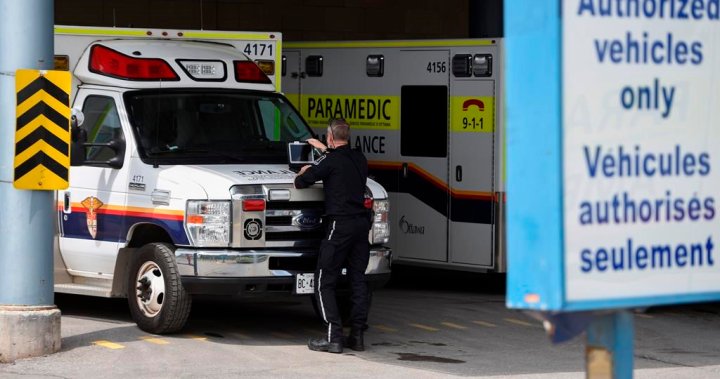Along the overcrowded ER lines; workers on strike due to burnout and overwork, ER at 178%, two people died.
Noted below it says specifically the strike didn't impact the ER staff levels, but did mean the 811 call center for non emergency health had less staff and long wait times.
https://www.cbc.ca/news/canada/montreal/anna-laberge-hospital-deaths-er-1.7049741
2 patients die waiting for care at hospital on Montreal's South Shore
Multiple investigations underway to determine what caused the deaths
Matthew Lapierre · CBC News · Posted: Dec 05, 2023 3:14 PM EST
Two people died while waiting for care at the Anna-Laberge hospital, in Châteauguay, Que., last week.
Health Minister Christian Dubé, who visited the hospital on Montreal's South Shore in the wake of the deaths to speak with the personnel involved, told reporters in Quebec City on Tuesday that the province's emergency rooms are full to bursting and the situation "is not improving."
"It's completely unacceptable that we have these situations in our emergency rooms here in Quebec," Dubé said.
The deaths are now the subject of multiple investigations, involving both the coroner's office and the local health authority, a spokesperson for the health authority said.
The spokesperson did not provide details on the deaths, but hospital management told Radio-Canada that the patients died in the ER on Nov. 29 and 30. Management said they hoped to have some ambulances directed away from the hospital so it did not receive as many patients.
The emergency room at the hospital is often crowded.
On Tuesday afternoon, a spokesperson for the health authority said 97 people were seeking treatment in the Anna-Laberge hospital's ER, putting it at 178 per cent capacity.
Thirty-one of them had been there for more than 24 hours; another 13 had been there for more than 48 hours.
The patients died while waiting for care at the Anna-Laberge hospitalon Nov. 29 and 30. (Radio-Canada)
Dominic Caisse, the interim president of the regional branch of the FIQ, a union that represents nurses and other health-care workers, said the ER is poorly laid out to receive and manage large numbers of patients.
"I hope that something is going to change," Caisse said. "I hope that the visit of Minister Dubé is going to come and help find some solutions."
Paul Brunet, a patients' rights advocate, said the hospital "has had for quite a long time some problems with managing its emergency room."
The deaths highlighted the need for hospital staff to continuously examine the state of patients in the ER, in case they worsen, Brunet said.
Opposition politicians in Quebec City lambasted the CAQ government's management of the problems in the province's emergency rooms, which Brunet said have been ongoing for decades.
Gabriel Nadeau-Dubois, co-spokesperson for Québec Solidaire, said delays in Quebec's ERs could be improved if the government gave striking health-care workers a new contract to get them back to work.
"The top priority is bringing people back and to do that an agreement needs to be reached as quickly as possible with the health-care workers," Nadeau-Dubois said.
WATCH | Why are Quebec public sector workers on strike?
'Exhaustion on a daily basis' among reasons why Quebec workers are striking
Some education and health-care workers say they're walking off the job because they're overworked and underpaid.
Dubé said the strikes were not affecting staffing levels in ERs, but that they were affecting staffing levels for the 811 health hotline, which he has pitched as an alternative to the ER.
Still, with respiratory viruses swirling, ERs will be so busy in the coming weeks that Dubé recommended staying away unless absolutely necessary.
"In the coming weeks, it's better to wait on the telephone than go to the ER," he said.

globalnews.ca



